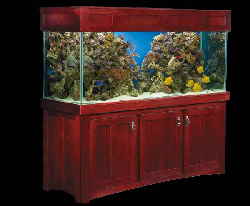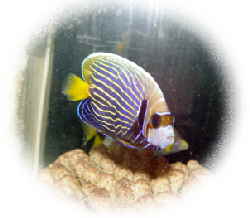|

Algae
Control
Algae is a large group of primitive, mostly aquatic, chlorophyll-bearing plants lacking specialize tissues and organs such as roots, stems, leaves, and flowers and including forms ranging from giant seaweeds to single-celled diatoms and pond scums. In the home aquarium we see many types of algaes. Different types of algae grow different environments and will have different nutritional requirements. Ridding your aquarium of algae can be a very simple process: remove the algae’s food source and it will perish. Like all living creatures all algae require a food source to survive.
Primary food sources:
Algae are simple plants. And like plants in the garden, algae consume the same compounds found in common fertilizers. Phosphate and Nitrate are the primary, but not exclusive, nutrients algae feed upon in the home aquarium. Phosphate and Nitrate are both added and produced in your display. Fish waste, uneaten food, and decaying plants and animals are ultimately broken down into these basic fertilizer compounds. For example, all living organism contain DNA, of which, phosphate is one of the primary compounds found in DNA. Many fish foods are blends of fish parts, shrimp, plants, etc. If uneaten, these foods are broken down into their basic chemical components, Phosphate and Nitrate being among them. Another source of Phosphates and Nitrate can be your local tap water, thus Premier Aquatic Services uses purified R/O water when applicable.
Additionally, high levels of Nitrates are toxic to all fish. So controlling and maintaining the concentrations of both Phosphates and Nitrates will result in less algae growth and water that is more fish friendly.
Some of the more common and annoying algae encountered in aquariums:
Diatom Algae typically is brown in appearance and usually is seen within the first 4-16 weeks following the install of an aquarium. Diatom algae have three basic needs to thrive: silicate as a food source, a low pH in a saltwater environment, and light in the yellow, orange, and red spectrum. During the first few weeks after an aquarium is set-up diatom algae growth can be very aggressive. It may cover the glass in as little as 48 hours. Diatom algae growth is normal and the direct result from the tremendous amount silica found in the synthetic salt used to make saltwater. Most synthetic sea salt manufacturers use silica, a moisture removing product, in the manufacture of synthetic salts. As the concentration of silica falls, the algae runs out of food, and slowly goes away.
“Typical” Green Algae usually appears as spots on the decorations in the aquarium and on the glass. Its growth can be random and like all algae, it growth is driven by nutrients present in the water.
Cyanobacteria exists in variety of forms and colors, including red, black, and green. Cyanobacteria is a morph between and algae and a bacteria. Treating the aquarium with an antibiotic can temporarily control these problematic bacteria, by killing approximately 99.8% of the cyanobacteria. However, an antibiotic-resistant strain may begin to grow. Anti-biotic treatment of cyanobacteria is a common practice in our industry because it can produce a quick impact on the appearance of the aquarium. But using anti-biotics to control cyanobacteria is nothing more than a “quick-fix” band-aid. While anti-biotics do kill unwanted cyanobacteria, anti-biotics also kill beneficial bacteria instrumental in the nitrogen cycle. Use anti-biotics carefully. When cyanobacteria is present, the underlying problem is an overabundance of organic nutrients.
Rule of Thumb for Controlling Algae:
Increase the export of the nutrients that algae feed on and limit the import of these same nutrients…or stated differently, remove the food source and remove the problem.
Increasing the export of nutrients…
Chemical Filtration Media are specially formulated chemicals which remove both phosphate and organic waste that algae feed on. While effective, chemical filtration media alone can not remove all dissolved phosphate and organic waste.
Protein Skimmers are very effective in removing undesirable organic compounds that algae feed on. It is amazing how much brown to black liquid can come from a crystal clear aquarium.
Routine water change is one the most affective way to remove both phosphate and nitrate from the aquarium. The new water does not contain nitrates or phosphates, thus Premier Aquatic Services performs a 30% water change monthly on all client aquariums.
Limiting the import of nutrients…
Overfeeding your fish is the number one reason for imbalanced water parameters and an overabundance of nutrients that algae feed on. Did you know that a fish’s stomach is about the same size as its eye? So, if there is still uneaten food floating or sitting on the bottom of your tank 60 seconds after you feed, your display has been overfed. What happens to the excess food? It is broken down into fertilizer and harmful waste by-products.
Overstocked aquariums occur when there are more fish present than the aquarium’s bio-load can handle. A good industry “rule of thumb”: 1 inch of fish per gallon of water in a freshwater environment and 1 inch of fish per 5 gallons of water in the saltwater environment.
For More information on care and diseases visit Premier Aquatics Pages
|